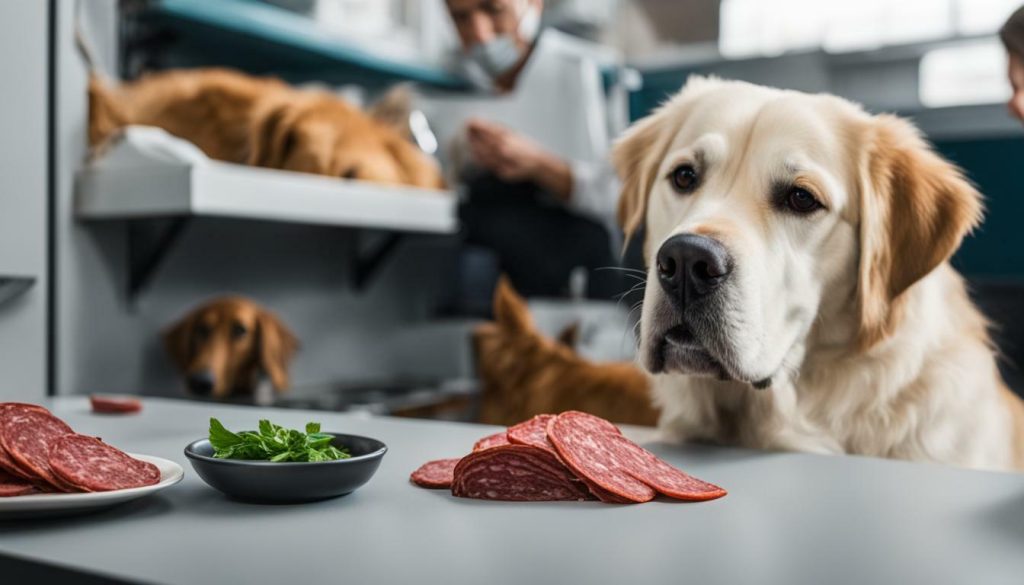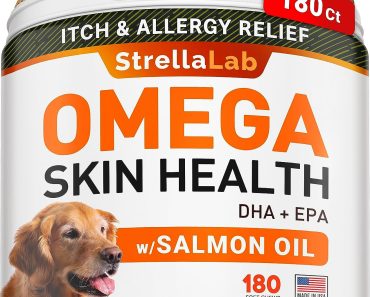
If you’re wondering whether it’s safe for your furry friend to indulge in this tasty treat, read on to find out everything you need to know about dogs and salami.
Salami should generally be avoided when it comes to feeding dogs. While a small amount of salami may not harm them, it is high in fat and can contain spices and additives that are toxic to dogs. The high-fat content can lead to weight gain, pancreatitis, and other health issues. Additionally, the seasonings and additives in salami can cause gastrointestinal distress. Dogs with certain health conditions, such as kidney or liver disease, should completely avoid salami. If a dog accidentally consumes a small amount of salami, monitoring for symptoms such as vomiting, diarrhea, and loss of appetite is important. It is always best to consult with a veterinarian for personalized advice.
Key Takeaways:
- Salami is generally not safe for dogs to eat due to its high fat content and potential toxic spices and additives.
- Feeding salami to dogs can lead to weight gain, pancreatitis, and gastrointestinal distress.
- Dogs with kidney or liver disease should avoid salami completely.
- If your dog accidentally consumes salami, monitor for symptoms and consult a veterinarian if needed.
- Consult with a veterinarian for personalized advice regarding your dog’s diet and any concerns about salami consumption.
Why Salami Should Be Avoided for Dogs
Despite its delicious flavor, salami should be avoided as a regular part of your dog’s diet due to the potential risks it poses to their health. While a small amount of salami may not cause immediate harm, it is important to understand the potential dangers that can arise from feeding salami to dogs. As responsible pet owners, it is crucial to prioritize your dog’s well-being and make informed decisions about their diet.
One of the main reasons why salami should be avoided for dogs is its high fat content. Dogs have different nutritional needs than humans, and consuming excessive fat can lead to weight gain and obesity-related health issues. Furthermore, the spices and additives commonly found in salami can be toxic to canines. These ingredients may cause gastrointestinal distress, including vomiting and diarrhea, which can be both uncomfortable and harmful for your furry friend.
 In addition to the aforementioned risks, another concern when it comes to salami consumption is the potential development of pancreatitis. This condition occurs when the pancreas becomes inflamed and can be triggered by a diet high in fat. Dogs with certain health conditions, such as kidney or liver disease, should completely avoid salami due to the potential adverse effects it can have on their already compromised organs.
In addition to the aforementioned risks, another concern when it comes to salami consumption is the potential development of pancreatitis. This condition occurs when the pancreas becomes inflamed and can be triggered by a diet high in fat. Dogs with certain health conditions, such as kidney or liver disease, should completely avoid salami due to the potential adverse effects it can have on their already compromised organs.
Expert Quote:
“Feeding your dog salami may seem like a tempting treat, but it’s important to remember that their bodies are not designed to handle the high fat and additives found in this cured meat. It’s best to err on the side of caution and opt for dog-friendly alternatives that will keep your furry friend healthy and happy.”
It’s crucial to remember that every dog is unique and may react differently to certain foods. If your dog accidentally consumes a small amount of salami, it’s important to monitor them closely for any symptoms such as vomiting, diarrhea, or loss of appetite. If these symptoms persist or worsen, seeking veterinary attention is recommended. Consulting with a veterinarian is always the best course of action to ensure your dog’s dietary needs are met and their health is prioritized.
The Impact of Salami on Dog’s Health
Feeding salami to your four-legged friend can have negative implications on their overall health and well-being, including potential weight gain and digestive issues. Salami is a cured meat that is typically high in fat, which can contribute to obesity in dogs. According to the Association for Pet Obesity Prevention, over half of dogs in the United States are overweight or obese, and a fatty treat like salami can exacerbate the problem.
“It’s important to remember that dogs have different nutritional needs than humans, and while salami may be a tasty treat for us, it can be detrimental to their health,” warns Dr. Emily Thompson, a veterinarian at Pet Health Clinic.
In addition to the high-fat content, salami often contains spices and additives that can be harmful to dogs. The seasonings, such as garlic and onions, can be toxic to canines and may cause gastrointestinal distress. Dogs with certain health conditions, such as kidney or liver disease, should completely avoid salami due to its potential adverse effects.
To ensure the well-being of your furry companion, it is best to seek alternative dog-friendly charcuterie options. There are plenty of safe and healthy meat snacks available that can still satisfy your pup’s taste buds. When selecting treats, look for options that are specifically formulated for dogs, free from harmful ingredients, and low in fat. Your veterinarian can provide personalized advice on suitable alternatives based on your dog’s specific dietary needs and health conditions.

Dog-Friendly Charcuterie Options
| Treat | Description |
|---|---|
| Lean Turkey | A lean protein source that can be offered as occasional treats. Make sure it is cooked thoroughly and free from seasonings and additives. |
| Carrot Sticks | Raw or cooked carrot sticks provide a crunchy treat that is low in calories and high in fiber. They are great for promoting dental health too. |
| Plain Chicken Breast | Boiled or grilled chicken breast without seasoning can be shredded or cut into small pieces for a delicious and protein-rich reward. |
| Freeze-Dried Liver | Freeze-dried liver treats are a popular choice among dog owners. They are typically low in fat and high in protein, providing a flavorful reward for your furry friend. |
| Vegetable Medley | A mix of cooked and chopped dog-friendly vegetables, such as peas, green beans, and sweet potatoes, can be a nutritious and tasty option for your pup. |
By choosing these alternatives and consulting with your veterinarian, you can ensure that your dog still gets to enjoy delicious treats without compromising their health. Remember, their well-being should always be a top priority.
Special Considerations for Dogs with Health Conditions
Dogs with certain health conditions require extra caution when it comes to including salami in their diet, as the high-fat content and additives can exacerbate their existing conditions. For example, dogs with kidney or liver disease should completely avoid salami due to its potential adverse effects. The high-fat content in salami can put additional strain on these organs, making it difficult for them to function properly.
In addition to the high-fat content, the spices and additives found in salami can also be problematic for dogs with sensitive stomachs or gastrointestinal issues. The seasonings in salami can cause irritation and lead to digestive problems such as vomiting or diarrhea. It is important to prioritize your dog’s health and consult with a veterinarian before introducing any new foods into their diet, especially if they have pre-existing health conditions.
If your dog has accidentally consumed a small amount of salami, it is important to monitor them closely for any signs of distress. Look out for symptoms such as vomiting, diarrhea, and loss of appetite. If any of these symptoms persist or worsen, it may be necessary to seek veterinary attention.
Consulting a Veterinarian for Personalized Advice
When it comes to your dog’s dietary needs and concerns related to salami consumption, it is always best to seek professional advice from a veterinarian. They can provide personalized guidance based on your dog’s specific health conditions and overall well-being. A veterinarian will be able to recommend alternative charcuterie options that are safe for your furry friend and can address any questions or concerns you may have.
Remember, your dog’s health should always be a top priority. By consulting with a veterinarian, you can ensure that you are making informed decisions about their diet and overall care.
| Health Conditions | Salami Consumption |
|---|---|
| Kidney or Liver Disease | Avoid completely |
| Sensitive Stomach or Digestive Issues | Exercise caution |
Accidental Salami Consumption and What to Do
If your furry friend happens to sneak a bite of salami, it’s crucial to be aware of the potential symptoms they might experience and take appropriate action. While some dogs may not show any immediate signs of distress, others may develop symptoms such as vomiting, diarrhea, or loss of appetite.
Monitoring your dog closely after they consume salami is important, as it allows you to assess their condition and determine if medical attention is necessary. If your dog exhibits any concerning symptoms or appears to be in discomfort, it is advisable to contact your veterinarian as soon as possible.

Remember, even a small amount of salami can have detrimental effects on your dog’s health, especially if they have pre-existing health conditions. It’s always best to err on the side of caution and avoid feeding salami to your canine companion altogether. Instead, opt for dog-friendly alternatives that are safe and nutritious.
| Alternative | Description |
|---|---|
| Lean Meat | Offer cooked chicken, turkey, or lean beef as a protein-rich treat. |
| Vegetables | Carrots, green beans, and sweet potatoes can make for crunchy and nutritious snacks. |
| Fruit | Slices of apple or banana can be a tasty and vitamin-packed option. |
By following these guidelines and being cautious about what your dog consumes, you can ensure their health and well-being. Remember, always consult with your veterinarian for personalized advice regarding your dog’s specific dietary needs and any concerns related to salami consumption.
Consulting a Veterinarian for Personalized Advice
When it comes to your dog’s health and nutrition, it’s always best to consult with a trusted veterinarian who can provide personalized advice tailored to your pet’s specific needs. While this article provides important information about the impact of salami on dogs’ health, it’s essential to remember that every dog is unique and may have individual considerations that need to be taken into account.
A veterinarian can assess your dog’s overall health, including any pre-existing conditions, and determine whether or not salami or other specific foods should be included in their diet. They can also recommend alternative options that are safe and appropriate for your dog’s consumption. Consulting with a veterinarian allows you to make informed decisions based on professional expertise, ensuring the well-being of your beloved pet.
Whether you have concerns about feeding your dog salami or any other aspect of their diet, a veterinarian can provide guidance on portion sizes, nutritional requirements, and potential risks. They can also discuss any symptoms or issues your dog may be experiencing and offer appropriate solutions. Remember, your veterinarian is a valuable resource and partner in your dog’s health journey.

Table: Dog-Friendly Alternatives to Salami
| Alternative | Description |
|---|---|
| Lean Cooked Meats | Grilled chicken, turkey, or lean beef can be a healthy and tasty substitute for salami. Ensure that the meat is cooked thoroughly without added seasonings or spices. |
| Fruit and Vegetable Treats | Fresh fruits and vegetables like apples, carrots, and green beans can be great options for dogs. Just ensure that they are properly washed and cut into bite-sized pieces. |
| Commercial Dog Treats | There are many dog treats available in the market that are specifically formulated for canine health. Look for treats that are low in fat and made with natural ingredients. |
| Peanut Butter | A small amount of peanut butter can be a tasty and healthy treat for dogs. Make sure it doesn’t contain xylitol, a sugar substitute that can be toxic to dogs. |
By seeking professional advice from a veterinarian and exploring dog-friendly alternatives to salami, you can ensure that your furry friend receives the proper nutrition and avoids any potential health risks associated with salami consumption. Remember to prioritize your dog’s health and consult with a veterinarian for personalized guidance and recommendations.
Exploring Dog-Friendly Alternatives to Salami
Fortunately, there are plenty of safe and delicious alternatives to salami that you can treat your dog to, ensuring they still get to enjoy the flavors they love. While it’s important to avoid giving your furry friend salami, you can opt for healthier and dog-friendly meat snacks that will keep their tails wagging with excitement.
One great option is cooked chicken or turkey breast, which provides lean protein and is easily digestible for dogs. You can cut it into bite-sized pieces or shred it for a tasty and nutritious treat. Another alternative is lean deli meats, such as roast beef or ham, but be sure to choose low-sodium options and avoid those with added spices or seasonings.
Fish can also be a fantastic alternative to salami. Salmon, for example, is rich in omega-3 fatty acids, which are beneficial for your dog’s skin and coat health. Grilled or baked fish without any seasonings is a safe and enjoyable option for your four-legged friend.
Vegetables can play a role in providing your dog with a variety of tasty and healthy snacks. Carrots are a popular choice among dogs and can be served raw or cooked. Not only do carrots satisfy their need to chew, but they are also low in calories and high in fiber. Other dog-friendly vegetables include green beans, sweet potatoes, and pumpkin.
Remember to always introduce new foods gradually and in moderation, especially if your dog has a sensitive stomach or food allergies. It’s a good idea to consult with your veterinarian to ensure that the alternatives you choose are suitable for your dog’s specific dietary needs.
| Treats | Description |
|---|---|
| Chicken or turkey breast | Lean protein, easily digestible |
| Lean deli meats (roast beef, ham) | Low-sodium options, avoid added spices |
| Fish (salmon) | Rich in omega-3 fatty acids, good for skin and coat health |
| Vegetables (carrots, green beans, sweet potatoes, pumpkin) | Satisfy chewing needs, low in calories, high in fiber |
By choosing these dog-friendly alternatives to salami, you can ensure that your canine companion enjoys delicious treats without compromising their health. Remember, always prioritize your dog’s well-being and consult with a veterinarian for personalized advice.

Conclusion
While a small amount of salami may not cause immediate harm to your dog, it is generally best to avoid feeding salami to your furry friend due to its potential risks and negative impact on their health.
Salami is high in fat, which can lead to weight gain and contribute to the development of pancreatitis, a serious inflammation of the pancreas. The seasonings and additives found in salami can also cause gastrointestinal distress, including vomiting, diarrhea, and loss of appetite. These symptoms can be uncomfortable for your dog and may require veterinary attention.
Dogs with certain health conditions, such as kidney or liver disease, should completely avoid salami as it can further compromise their already weakened organs. It is important to prioritize your dog’s health and well-being by providing them with a balanced diet that supports their specific needs.
If your dog accidentally consumes a small amount of salami, it is essential to monitor them closely for any adverse reactions. Look out for symptoms such as vomiting, diarrhea, abdominal pain, or any changes in behavior or appetite. If these symptoms persist or worsen, it is advisable to seek veterinary attention for a thorough examination and appropriate treatment.
When it comes to your dog’s dietary needs, it is always best to consult with a veterinarian for personalized advice. They can provide guidance on safe and healthy alternatives to salami that can still satisfy your pup’s taste buds. There are plenty of dog-friendly meat snacks available that are specifically designed to meet your dog’s nutritional requirements and keep them happy and healthy.
FAQ
Can dogs eat salami?
No, it is generally not recommended to feed salami to dogs due to its high fat content and potential toxicity from spices and additives.
Why should salami be avoided for dogs?
Salami should be avoided for dogs because it is high in fat and can contain spices and additives that are harmful to their health.
What impact can salami have on a dog’s health?
Feeding salami to dogs can lead to weight gain, pancreatitis, and gastrointestinal distress.
Are there special considerations for dogs with health conditions?
Yes, dogs with kidney or liver disease should completely avoid salami due to its potential adverse effects.
What should I do if my dog accidentally consumes salami?
If your dog accidentally consumes a small amount of salami, monitor for symptoms such as vomiting, diarrhea, and loss of appetite. It may be necessary to seek veterinary attention.
Should I consult a veterinarian for personalized advice?
Yes, it is always best to consult with a veterinarian for personalized advice regarding your dog’s dietary needs and concerns related to salami consumption.
Are there dog-friendly alternatives to salami?
Yes, there are many dog-friendly alternatives to salami that can still satisfy your pup’s taste buds. Safe and healthy meat snacks can be offered as treats without compromising your dog’s health.






